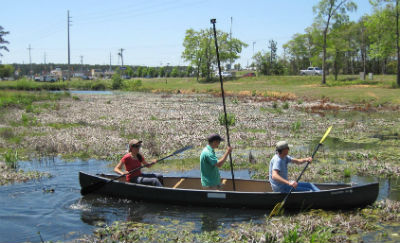Reprinted from the Tideland News
CAPE CARTERET — After months of discussion and behind-the-scenes activity, there are finally visible signs of things to come at the troubled drainage ponds in front of Cape Carteret Baptist and Presbyterian churches.
Supporter Spotlight
Lexia Weaver, coastal scientist for the N.C. Coastal Federation in nearby Ocean, said surveyors were out in a canoe, taking depth and other measurements necessary to develop the cleanup plan.
The goal, Weaver said last week, is to have two or three possible design concepts ready for consideration by the two churches by the end of May. Once a plan is chosen, work can begin to return the ponds to their wetlands function as stormwater retention and filtration areas.
 N.C. Coastal Federation staff, Rachel Bisesi in the stern and Sam Bland in the bow, help survey one of the ponds. That’s engineer Kriss Bass with the survey pole. |
A conservation easement allows the churches to install benches, walkways, bridges, plantings and other amenities that would make the pond areas suitable for worship and other passive uses, but still maintain the former pond sites as natural areas capable of handling the significant runoff from the properties and other hardened surfaces, such as adjacent N.C. 24.
Longstanding problems with the ponds were exacerbated in November 2012 when a water control structure failed and the water drained into Deer Creek, an already impaired creek designated by the state as shellfish waters. Cape Carteret officials contacted the federation to see what could be done, and the organization suggested that the ponds be turned into wetlands.
The state Division of Water Quality, now the Division of Water Resources, had surveyed the larger pond but said it would not take responsibility to help restore it. The state Department of Transportation also declined to help, despite having four pipes that bring water into the pond from N.C. 24. The Army Corps of Engineers said that the ponds predated its permitting process, but if the Corps become involved in fixing the pond, a permit would be needed before any work is done.
Supporter Spotlight
At one point, all involved envisioned seeking a state grant that would have required the two churches to pay 20 percent of the project bill. The town agreed to act as a fiscal agent for the grant, but would assume no fiscal responsibility or liability for the project itself; the churches’ costs were expected to be $20,000 to $25,000 each, and a total cost of $200,000 or so was envisioned.
That was a viable solution, but because of the high cost to the churches, was not optimum. And even that fell through when the federation learned that the project no longer qualified for the federal Environmental Protection Agency grant.
Then the federation closed on the sale of an easement at its massive North River Farms wetlands project in eastern Carteret County for $3 million. Todd Miller, the federation’s executive director, thought cleaning up the ponds would be a neighborly – and environmentally significant – thing to do.
Once a project is complete, cypress trees and other wetlands plants should be able to take up most of the stormwater runoff, and there should be just a small trickle that will flow out into Deer Creek, according to Weaver, who has helped design and implement plans for numerous wetlands projects, ranging from small rain gardens at schools and other public facilities, including the Cedar Point Town Hall.
The pond area also serves as a sort of scenic gateway to Cape Carteret, and Mayor David Fowler has been a big supporter of the project.







